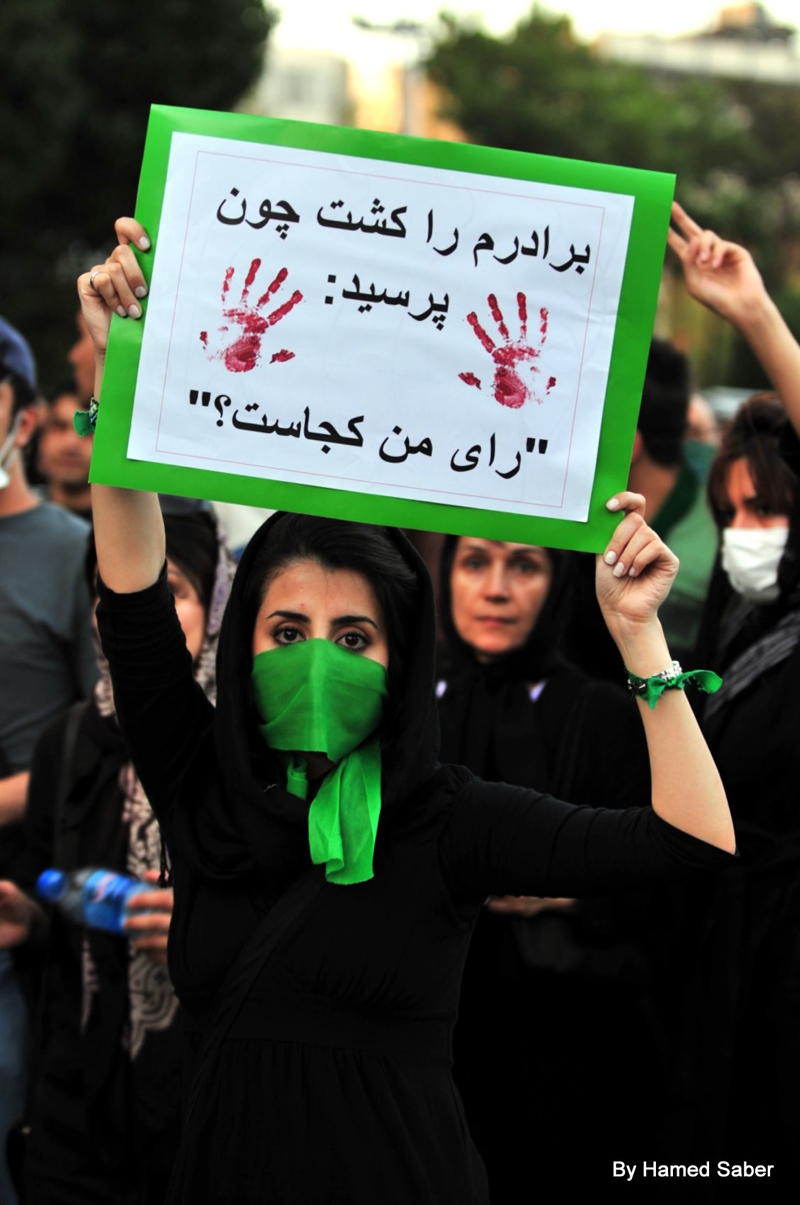Comparing our Iran negotiations to our Soviet negotiations

Iranian protestor, June 17, 2009: “They killed my brother, because he asked ‘where’s my vote?’”
Someone a lot smarter than me is noticing that we do not see ourselves as a beacon of freedom, as we did when we opposed the Soviet Union. Natan Sharansky asks, When did America forget that it’s America? He is basically pointing out the same thing I did: that we are not defining civilization as better than barbarism.
As a former Soviet dissident, I cannot help but compare this approach to that of the United States during its decades-long negotiations with the Soviet Union, which at the time was a global superpower and a existential threat to the free world. The differences are striking and revealing.
…
Imagine what would have happened if instead, after completing a round of negotiations over disarmament, the Soviet Union had declared that its right to expand communism across the continent was not up for discussion. This would have spelled the end of the talks. Yet today, Iran feels no need to tone down its rhetoric calling for the death of America and wiping Israel off the map.
… for example, when the Soviets invaded Afghanistan shortly after the SALT II agreement had been signed, the United States quickly abandoned the deal and accompanying discussions.
Today, by contrast, apparently no amount of belligerence on Iran’s part can convince the free world that Tehran has disqualified itself from the negotiations or the benefits being offered therein. Over the past month alone, as nuclear discussions continued apace, we watched Iran’s proxy terror group, Hezbollah, transform into a full-blown army on Israel’s northern border, and we saw Tehran continue to impose its rule on other countries, adding Yemen to the list of those under its control.
Then there is the question of human rights. When American negotiations with the Soviets reached the issue of trade, and in particular the lifting of sanctions and the conferring of most-favored-nation status on the Soviet Union, the Senate, led by Democrat Henry Jackson, insisted on linking economic normalization to Moscow’s allowing freedom of emigration…
Iran’s dismal human rights record, by contrast, has gone entirely unmentioned in the recent negotiations. Sadly, America’s reticence is familiar: In 2009, in response to the democratic uprisings that mobilized so many Iranian citizens, President Obama declared that engaging the theocratic regime would take priority over changing it.
Sharansky concludes what I did, but he says it more eloquently: “in today’s postmodern world, when asserting the superiority of liberal democracy over other regimes seems like the quaint relic of a colonialist past, even the United States appears to have lost the courage of its convictions.”
Unlike past administrations—across the political spectrum—our current White House does not seem to believe that America stands for anything worth fighting for, and a wide swath of the left appear to agree.
If we had acted, in 1988 and 1989, when people began to rise up against the Soviet Union, the way we acted when people began to rise up against Iran in 2009, the Soviet Union would still exist, would still be an oppressive regime, and would most likely have expanded its circle of oppression while acting more violently against the United States. More of the world would be Cuba, and less of it South Korea. More of it would be Benghazi, and less of it Estonia.
In response to Republicans and America must provide an alternative: If America does not provide an alternative to the evils of progressivism gone awry in the world, it is lost.
- When did America forget that it’s America?: Natan Sharansky at The Washington Post
- “As a former Soviet dissident, I cannot help but compare this approach to that of the United States during its decades-long negotiations with the Soviet Union, which at the time was a global superpower and a existential threat to the free world. The differences are striking and revealing.” (Memeorandum thread) (Hat tip to William A. Jacobson at Legal Insurrection)
More Iran
- A tested alternative for Iranian nuclear negotiations
- There is a way to stay true to America and negotiate in good faith with Iran, without capitulating everything at once.
- Iranian crisis continues
- Despite the lack of coverage, the Iranian protestors continue to fight.
More Natan Sharansky
- We are not free unless we fight for the freedom of others
- If we don’t act like freedom matters overseas, we won’t act like freedom matters domestically.
More Soviet Union
- The Best of Omni Science Fiction No. 2
- I always enjoyed Omni, but, unlike its sister publication, I enjoyed it for its photos more than for the stories. It’s best, however, was not too bad, at least from 1978-1980.

Bumped eight hours, because this is more important than the death of broadcast television.